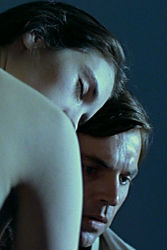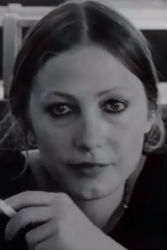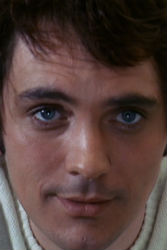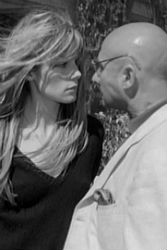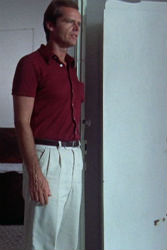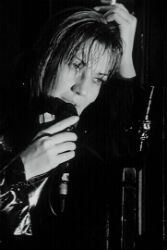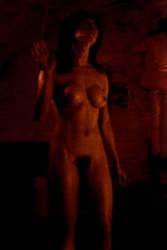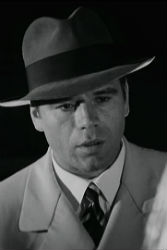The Bitter Tears of Petra von Kant
Rainer Werner Fassbinder, 1972
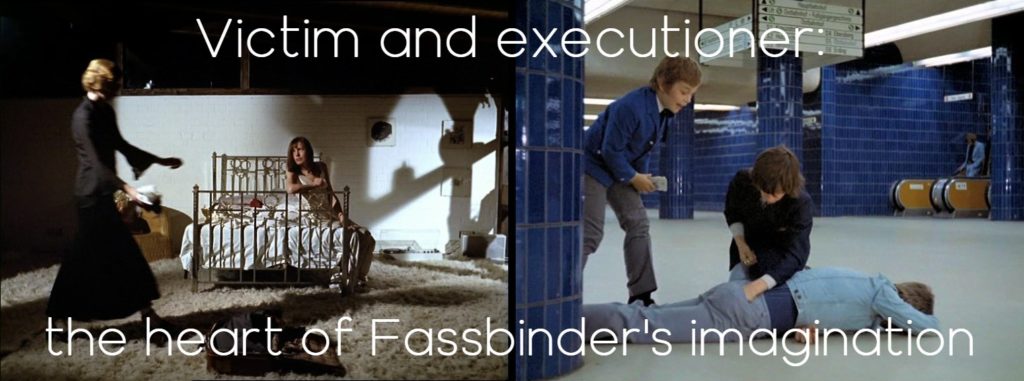
The Bitter Tears of Petra von Kant | Fox and His Friends
FABIO VIGHI ON ‘THE BITTER TEARS OF PETRA VON KANT’ and other FASSBINDER FILMS
Posted by kind permission of Fabio Vighi
From Fabio Vighi, Sexual Difference in European Cinema: The Curse of Enjoyment (UK: Palgrave Macmillan, 2009) pp. 104-114.
Fabio Vighi is Professor of Italian and Critical Theory at Cardiff University. His research focuses on critical theory, theoretical psychoanalysis and film.
I SUFFER, THEREFORE I AM
Rainer Werner Fassbinder’s cinema is a voyage to the Real, and amongst the most recklessly unashamed ones in European film. The trait of Fassbinder’s cinema that makes it absolutely relevant today is its ability to explore the tortured connections between desire, power and liberation, on both a personal and collective level. Particularly intriguing is the director’s ambiguous stance on the question of masochism as a strategy of liberation. When one looks at Fassbinder’s composite oeuvre, it is difficult not to notice the centrality reserved to the treatment of masochism, which is what is truly at stake in his interest in abject characters portrayed as victims. The relationship between victim and executioner is at the pulsating heart of Fassbinder’s imagination.

Rainer Werner Fassbinder | Photo: Peter Jansen, 1978
One thing must be clear from the start. When I refer to masochism as a strategy of liberation I do not mean ‘the theatre of sadomasochism’, which is merely a way to dupe the guard of the superego (to pretend that we are contravening its injunction to enjoy whilst we are actually enjoying pain). In Seminar VII, Lacan (1999: 239) stated that “the economy of masochistic pain ends up looking like the economy of goods”, which means that “pathological sado-masochism ultimately involves a ‘utilitarian’ pain for the sake of pleasure and, as such, does not go beyond the pleasure principle” (Chiesa 2007: 180). And even less am I referring to the postmodern logic of victimisation which, as Zizek has convincingly argued, is part and parcel of today’s ideological predicament.
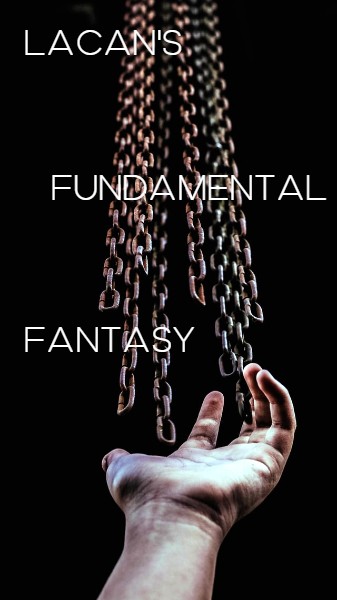
Photo: Zulmaury Saavedra
What I am aiming at involves, rather, the painful confrontation with Lacan’s fundamental fantasy, upon whose foreclosure the process of subjectivation is based: “what the fundamental fantasy stages is precisely the scene of constitutive submission/subjection that sustains the subject’s ‘inner freedom’” (Zizek, 2000a: 280). The ruse of ‘masochistic theatre’ is nicely captured in the famous scene from Buñuel’s The Phantom of Liberty where a sadomasochistic couple meticulously arranges for an oddly-assorted audience (including four monks) to congregate in a hotel room with the excuse of sharing some Port and engaging in civilised conversation. After changing secretly into their S&M attire, the two suddenly perform their ‘whipping act’ in front of the stunned audience, even complaining when, a few moments later, these unwitting onlookers start flocking out of the room in shock and disbelief.
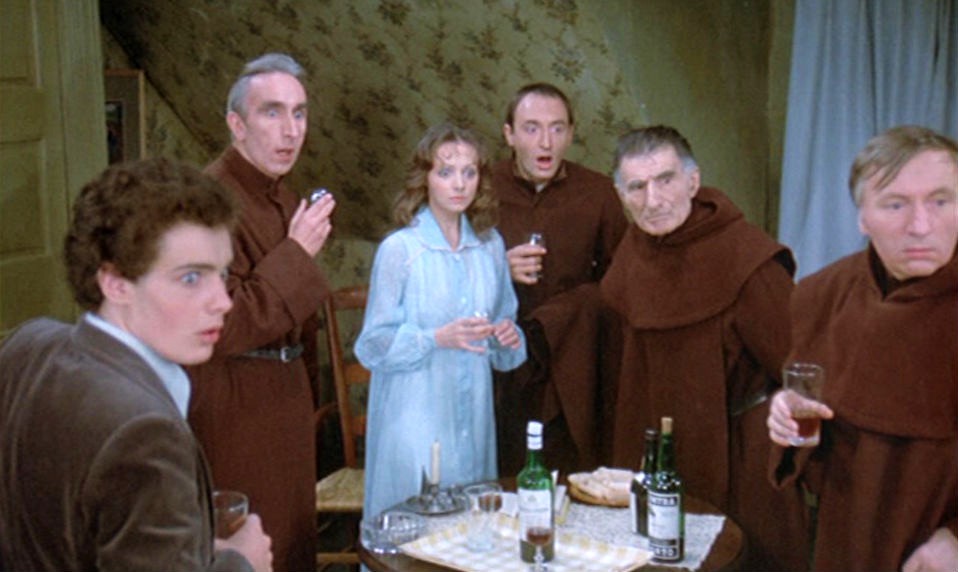
Luis Buñuel, The Phantom of Liberty, 1974
The point to emphasise is that such performances do not disturb the smooth functioning of the symbolic order, precisely because they openly rely on its efficiency: firstly, ‘the faked spectacle of punishment’ (Zizek 2000a: 281) can function only previous to the stipulation of a symbolic contract between the masochist and his dominatrix; secondly, it is sustained by a third gaze, i.e. it is performed for the big Other.
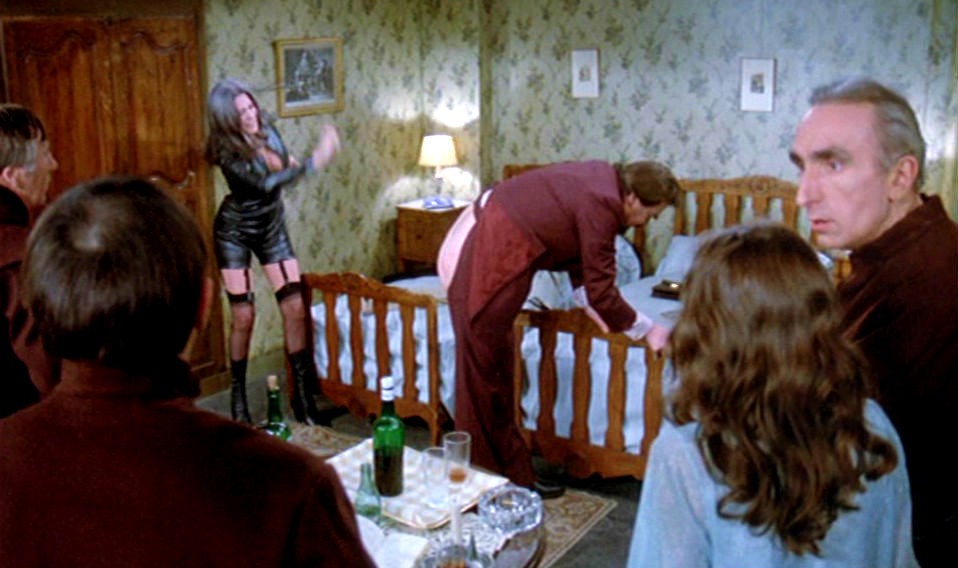
Luis Buñuel, The Phantom of Liberty, 1974
In Fassbinder’s cinema we experience an altogether different, more complex approach to masochism. In this respect, the first thing to do is recognise a basic elusiveness in the director’s own position, a slight disparity between what he consciously argues for and what his films unconsciously reveal. As for his cinematic use of and political interest in masochism, his stance seems fairly clear: ‘There is no such thing as masochism without sadism. And relationships between people are always sadomasochistic as a direct result of their upbringing’ (in Rayns 1979: 93).

Photo: Henri Pham
According to Fassbinder, the distorted character of contemporary sexual or more generally social relationships is to be understood as a historically specific dysfunction emanating directly from the contradictions of our socio-political milieu. This is why the key character in his cinema is ‘the victim’ and the key theme ‘the manipulability, the exploitability of feelings within the system that we live in, and that at least one generation or more after us will certainly have to live in’ (Fassbinder 1992: 28). On the other hand, he also adumbrates a more profound and to an extent indefinable role played by masochism, one that not only reflects and denounces social injustice but also hints at liberation: ‘only those individuals who can accept their own masochism are on the way to being healthy. Yes, to enjoy pain is always cleverer than simply to suffer it’ (in Rayns 1979: 94). Fassbinder’s position on masochism, as it emerges in his writings, can therefore be summed up as follows: 1. Perverted human (sexual) relationships are the result of social injustice. 2. The way out of this predicament involves directly assuming the very dysfunction.
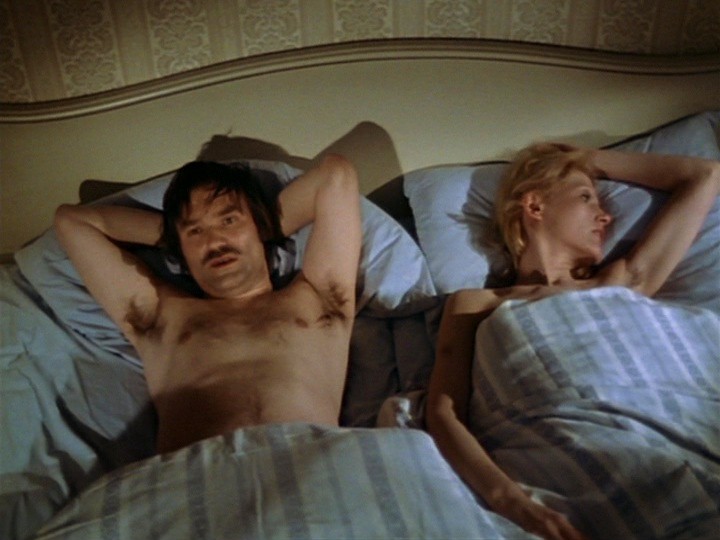
Ulrich Faulhaber & Margit Carstensen, Fear of Fear, Rainer Werner Fassbinder, 1975
The immediate remark to make concerns the first point. Considering the sexual deadlock as an epiphenomenon, i.e. the result of a more fundamental disturbance (class difference), only makes sense if conceived against the background hypothesis of a ‘healthy’ universe where sexual difference, as well as class difference, would be eliminated. There is a moving sequence in Gods of the Plague (Götter der pest, 1970) where Franz Walsch (Harry Baer), the Gorilla (Gunther Kaufmann), and Margarethe (Margarethe von Trotta), imagine their escape to a Greek island, where they would live on fishing, hunting and drinking wine.
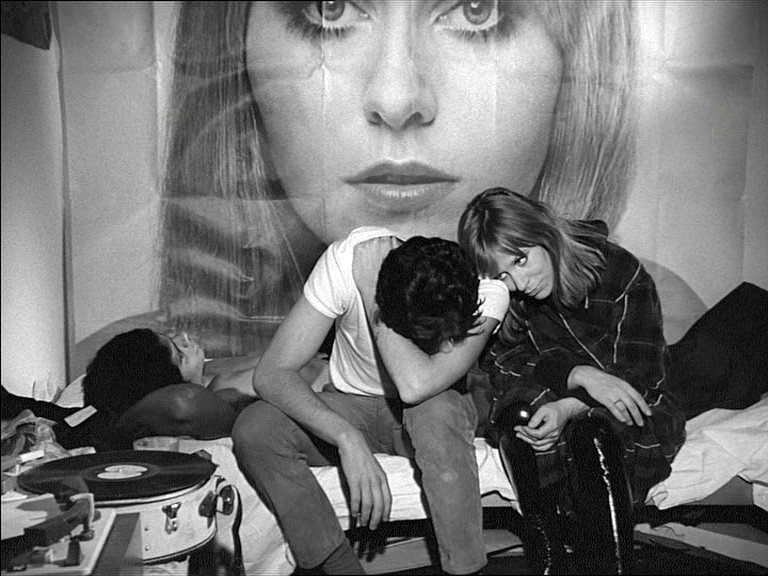
Günther Kaufmann, Harry Baer, Margarethe von Trotta, Gods of the Plague, Fassbinder, 1970
Similarly, the whole of Rio Das Mortes (1970) is built around the longing for an alternative life in Peru. These examples capture the key tension and dominant mood in Fassbinder’s cinema (especially of the earlier phase), which is one where the sleepwalking hopelessness of his stylised crooks and drifters is somewhat magically related to a utopian/anarchic space outside modern alienation, without however giving in to its lure. Utopia for Fassbinder also seems to mean the end of sexual difference, a social community where the loved one is gleefully shared with one’s best friend. Such a society ‘would function without hierarchies, without fear, without aggression’ (Fassbinder 1992: 19), something akin to a democratic order not based on repression. If on the one hand this view reminds us of Fassbinder’s sympathy for anarchic movements, on the other it ties in with the Marxian thesis of the classless society to come. It is here that we should emphasise how strongly Fassbinder’s cinema resists ceding to its utopian temptation and, instead, keeps proposing, obsessively, the dialectic of degradation and liberation.

Rio das Mortes, Rainer Werner Fassbinder, 1970
In a similar manner to Pasolini, Fassbinder knew that every true process of liberation from a given power edifice implies a painful passage through a dark, at least minimally masochistic scenario, since the subject is first and foremost required to gain a distance from his/her obscene libidinal attachment to, or investment in, what keeps him/her in check. The problem is therefore that freedom cannot be embraced effortlessly. When, for instance, he was asked why the servant Marlene (Irm Hermann) walks out at the end of The Bitter Tears of Petra von Kant, when Petra (Margit Carstensen) offers her freedom and equality, Fassbinder gave a very precise answer: ‘Because the servant accepts her own repression and exploitation, and is therefore afraid of the freedom she is offered. What goes with freedom is the responsibility of having to think about your own existence, and that is something that she has never had to do; she has always simply followed orders, and never had to make her own decisions. When she finally leaves Petra, she is not, I think, heading for freedom but going in search of another slave-existence. It would be wildly optimistic, even utopian, to imagine that someone who has done and thought nothing for thirty years except what others have thought for her would all of a sudden choose freedom.’ (in Rayns 1979: 84-5)
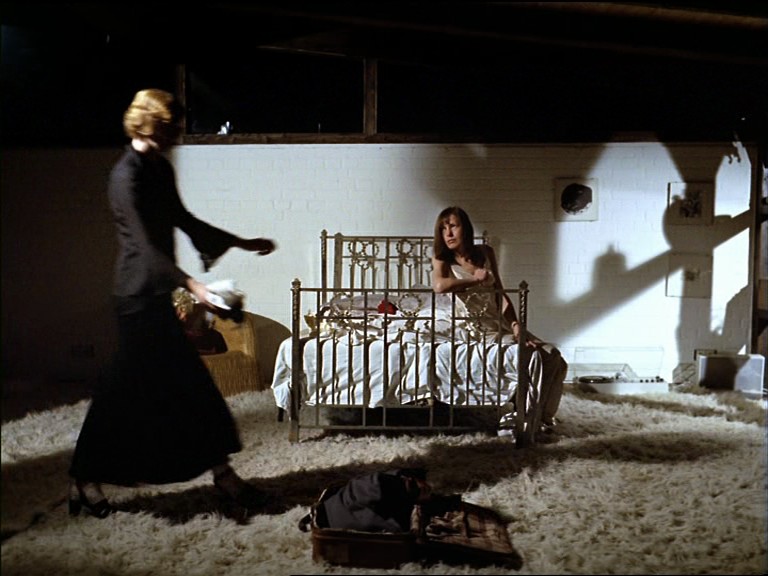
Irm Hermann & Margit Carstensen, The Bitter Tears of Petra von Kant, Fassbinder
One thinks here of Lars Von Trier’s Manderlay (2005), which shows how problematic a question emancipation from slavery (let alone the introduction of democracy) is — or, for that matter, Viridiana, where Bunuel cruelly mocks his heroine’s idealism. Interestingly, at one point the naivety of Manderlay’s heroine Grace (Bryce Dallas Howard) transfers from the social arena to the bedroom, encountering there the same substantial impasse: the handsome black slave she had idealised in the name of what we might call her ‘multicultural ethos’ turns out to be disturbingly over-aggressive.
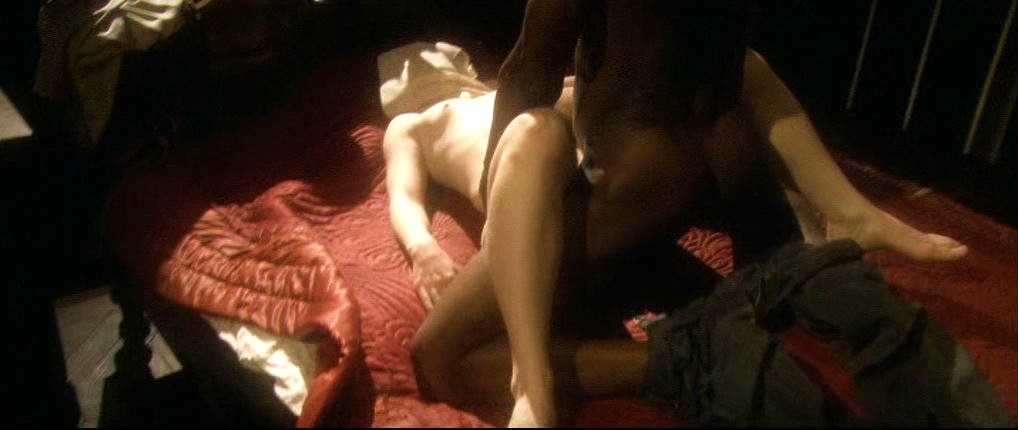
Lars von Trier, Manderlay, 2005
The persistence with which Fassbinder stages the eroticisation of pain accounts for his awareness that what is at stake in masochism is not only submission, but also, crucially, our most profound attachment to life. What Fassbinder relentlessly attempts to represent is the masochistic experience as something akin to the fundamental fantasy, which ‘provides the subject with the minimum of being, it serves as a support for his existence — in short, its deceptive gesture is ‘Look, I suffer, therefore I am, I exist, I participate in the positive order of being’ (Zizek 2000a: 281). And the point is that our unconscious masochistic attachment to life needs to be consciously (and painfully) assumed if we are to free ourselves from its spell.
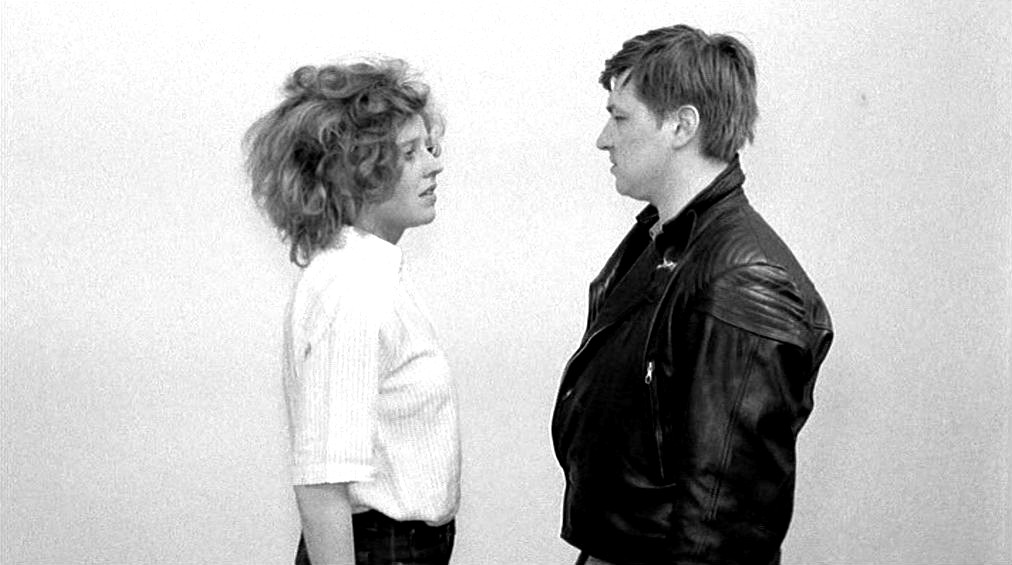
Hanna Schygulla & Rainer Werner Fassbinder, Love is Colder than Death, 1969
But let us go back to sexual difference. In Fassbinder’s cinema there is clearly no such thing as freedom in sexual, as well as class, relationships. From his first films to Querelle de Brest (1982), the universality of class difference finds a veritable echo in the universal resonance of sexual difference.

The Bitter Tears of Petra von Kant, with its constantly oscillating emphasis on sexual (Petra and Karin) and class (Petra and Marlene) difference, is a perfect case in point. It chronicles the torrid lesbian relationship between Petra, a successful and arrogant fashion designer in her mid-30s, and Karin (Hanna Schygulla), a cunning young woman cynically after a career in modelling; as such it amounts to a prototypical story of power struggle in the sexual relationship. Although the film features only women (women caught in a bourgeois/patriarchal narrative), the impasse it explores is presented as ontological, irrespective of historical or gender-related considerations. The revealing aspect is (as always with film) form, that is to say the specific aesthetics the film embraces. The narrative’s thematic claustrophobia and bleakness are reflected successfully in its style, for the entire story takes place in Petra’s apartment, conceived as a theatre stage.
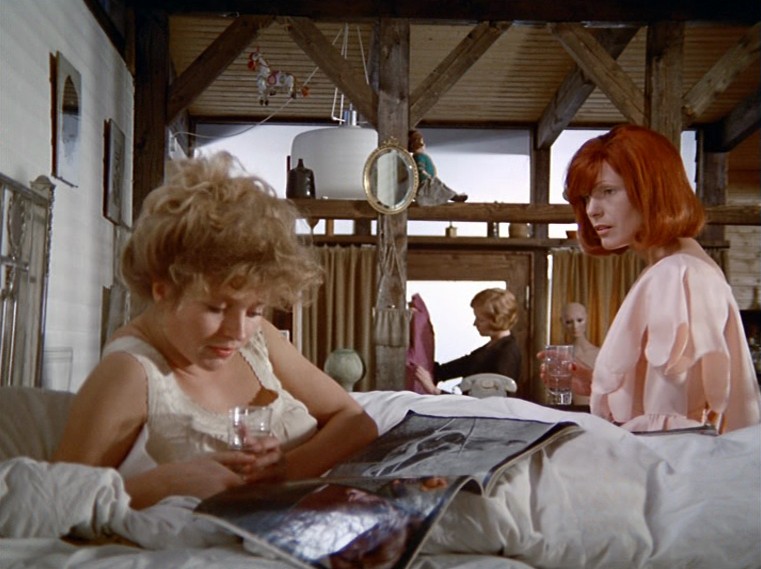
Hanna Schygulla, Irm Hermann, Margit Carstensen, The Bitter Tears of Petra von Kant, Fassbinder
Typically, Fassbinder exploits filmic resources with great inventiveness (deep focus compositions, tracking shots, etc.) and, more importantly, in such a way that they materialise the narrative’s deepest concern. In this case, it is a matter of building an invisible cage around the main character. Thus humiliation, including self-humiliation (Petra is an auto-biographical character), becomes a stylistic cipher. In infusing narratives of degradation with aesthetic pleasure, Fassbinder’s cinema as a whole reinforces the concept that liberation can only be the result of ‘self-beating’. Formally, the aim is to draw us as close as possible to the hopeless condition of his fictional characters, to the point that we might find ourselves empathising with their condition of radical exclusion. Fassbinder achieves this by constantly juxtaposing Brechtian estrangement and classic (Hollywood) identification techniques.
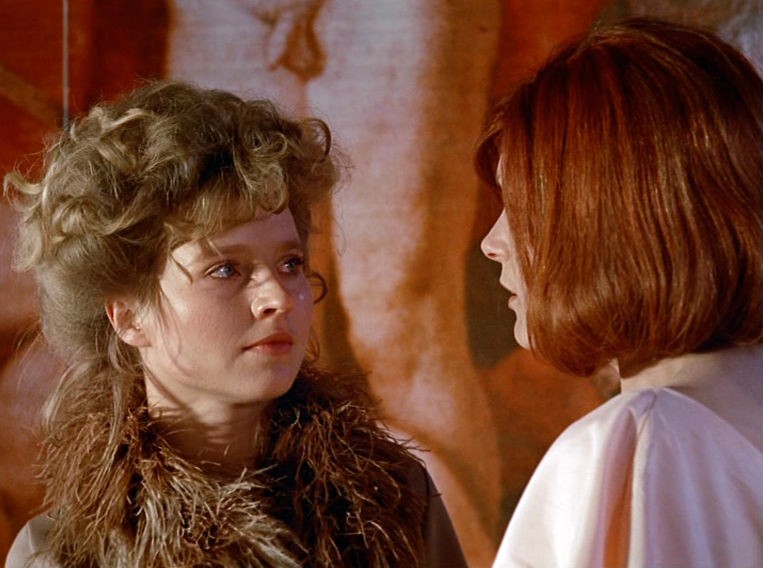
Hanna Schygulla & Margit Carstensen, The Bitter Tears of Petra von Kant, Fassbinder
In this respect, the question of femininity is central. Fassbinder’s cruelty is not directed at women, as many critics noted, with indignation, when The Bitter Tears of Petra von Kant was released. It is mainly self-directed, insofar as the self matters objectively, as the most trustworthy representative of the external world, a world engaged in an endless struggle with its own contradictions. One of the basic lessons of psychoanalysis is that to be able to look at the world we first have to pass through the self, and take its division into consideration. This is why it would be a mistake to explore Fassbinder’s work through the ‘identity politics’ paradigm. Not only have questions of race, gender and ethnicity always been secondary, for him, to the question of class: ‘I’m often irritated by all the talk about women’s liberation. The world isn’t a case of women against men, but of poor against rich, of repressed against repressors. And there are just as many repressed men as there are repressed women’ (in Rayns 1979: 85); but also, at a deeper level, the question of sexual difference is treated by him as homologous to that of class difference, in the sense that it disturbs the same universal split.
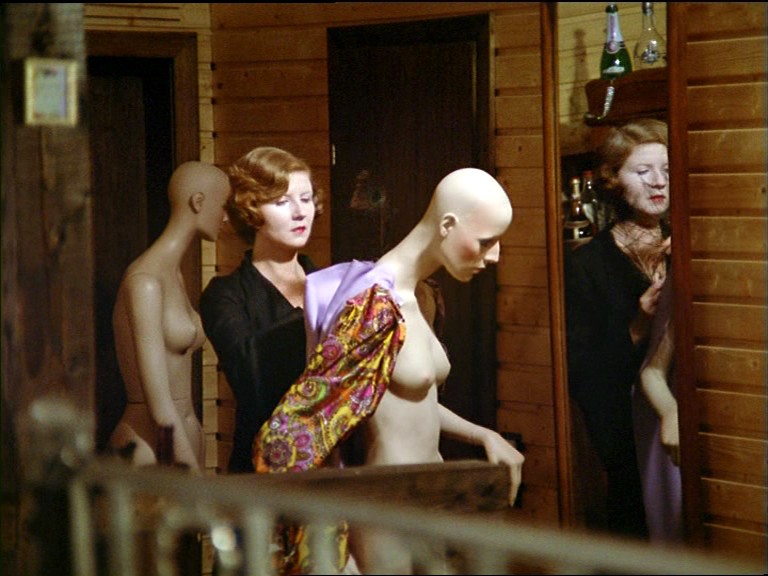
Irm Hermann, The Bitter Tears of Petra von Kant, R.W. Fassbinder
If Fassbinder has often preferred to work with female characters, then, it is because of the rich complexity he saw in feminine sexuality (see Rayns 1979: 89), and because of his personal affinity with it in terms of sensitivity. This complexity concerns mainly woman’s basic ambiguity towards oppression: ‘I know some fairly emancipated women who enjoy being repressed and at the same time fight against their repression. It’s a state full of contradictions’ (in Rayns 1979: 91). Once again, we should insist that Fassbinder — like Pasolini, Bergman, Godard, and to an extent Von Trier — is profoundly fascinated by this contradiction, which is more likely to emerge in femininity and effectively amounts to the enigma of masochism. One thinks of Godard’s 1960s films, where woman is often represented as a commodity, an image exploited by consumerism; again, the key point is that, in films such as Vivre sa vie (1962), to this position of exploitation corresponds woman’s readiness to fully assume it (see Sontag 1964).
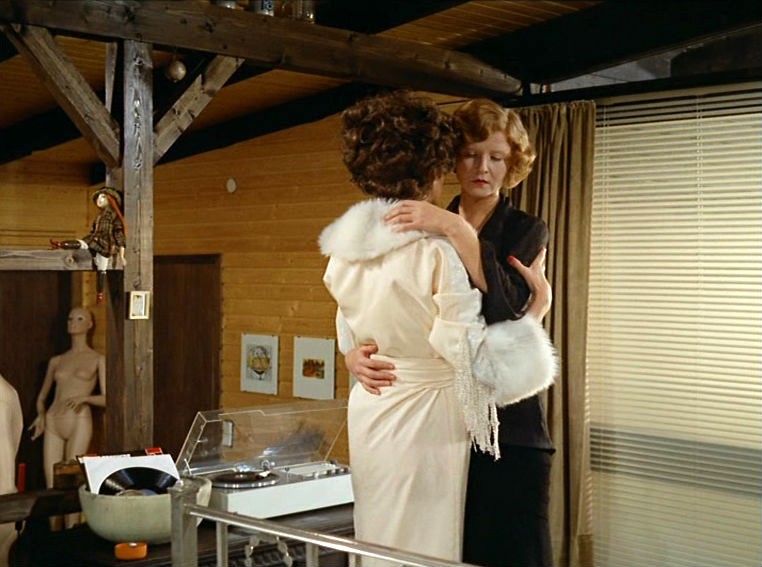
Margit Carstensen & Irm Hermann, The Bitter Tears of Petra von Kant, Fassbinder
As for Fassbinder, a work like Fox and His Friends (Faustrecht der Freiheit, 1975) shows the extent to which gender, for him, is a psychological condition inextricably related to class. As a gay film, it goes as far as it can to demonstrate that the identity issue is less relevant than the question of class difference.

The striking point about this film, and a sign of Fassbinder’s genius, is that it dares not to represent gays as a victimised minority; on the contrary, the ‘gay universe’ is explicitly linked to the oppressing class, to the extent that it is even associated with Nazi ideology. Franz Bieberkopf, nicknamed Fox and played by Fassbinder himself, is a young working-class (unemployed) gay man who wins the lottery, falls in love with Eugen (Peter Chatel), is drawn into upper-class gay circles, and is eventually ripped off, humiliated, driven to despair and, finally, to suicide by his rich friends. The film’s charm, irrespective of its bleak narrative, is that despite being totally immersed in a gay universe it is actually more concerned with the issue of class exploitation. Being gay is never presented as a problem; rather, it is seen as the norm. This is explicitly stated, for example, in the scenes where Eugen’s parents are shown as being more worried about their social status and financial condition than their son’s ‘deviant’ sexual inclinations. The gay middle-/upper-class world is denounced by Fassbinder as being corrupted, hedonistic and evil, which works well as an indictment not only of the dominant gay world itself but more importantly of the dominant class.
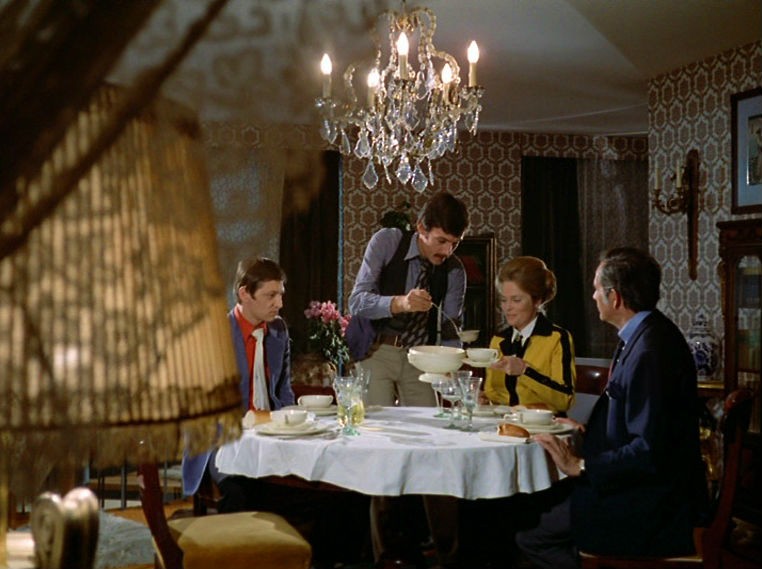
Fox and His Friends, Rainer Werner Fassbinder, 1975
The crucial theme of the film, however, has to do with Fox’s more or less unconscious death-drive. As with most of Fassbinder’s heroes, he is depicted as complicit in his own downfall, which means that we are not merely dealing with a case of social Darwinism. More significantly, we find here the same overall strategy often used by Pasolini, inasmuch as the film as a whole is constructed around the figure of a poor devil whose inevitable demise proves instrumental to the uncovering of the oppressors’ sadistic perseverance in evil. It is not only that without figures like Fox — or, say, Accattone (Franco Citti) in Pasolini’s eponymous 1961 debut-feature — any denunciation of the brutal heart of power would prove unpersuasive, but rather that it is only in the character’s Fall that one is encouraged to read the signs of a new beginning. True hope can only emerge from hopelessness.
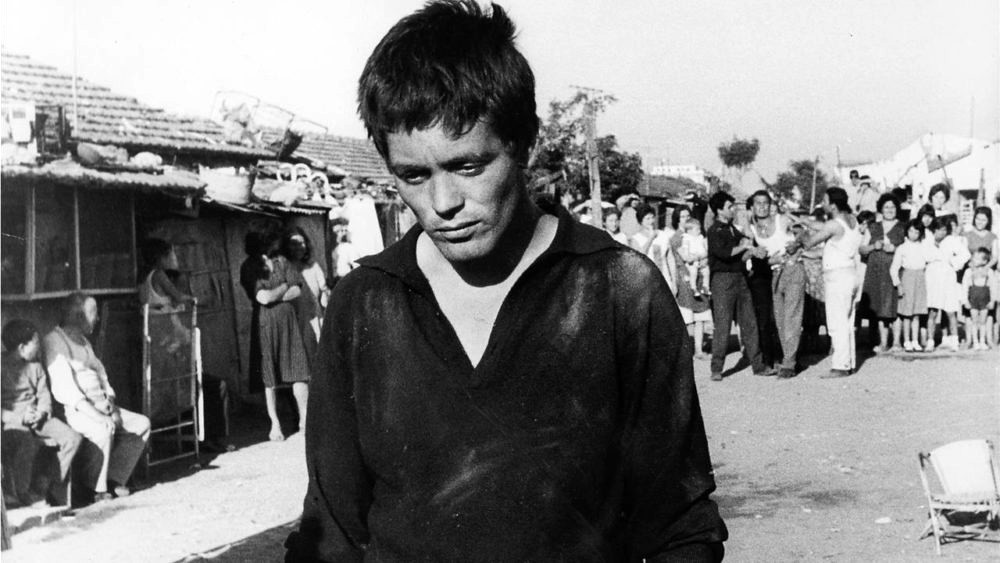
Franco Citti, Accattone, Pier Paolo Pasolini, 1961
The key Christian topos of Fall and Redemption—in itself a central theme in European cinema—is a dominant trait of Fassbinder’s sensitivity. Apropos this double movement, Zizek highlights how Redemption is already implicitly contained in the Fall: ‘The Fall is in itself already its own self-sublation, the wound is in itself already its own healing, so that the perception that we are dealing with the Fall is ultimately a misperception, an effect of our distorted perspective. We rise again from the Fall not by undoing its effects, but in recognizing the longed-for liberation in the Fall itself.’ (Zizek 2003: 86)

Photo: Sharon McCutcheon
In its ruthless cruelty, the final sequence of Fox and His Friends — depicting two kids as they mercilessly search Fox’s dead body after his suicide — speaks for the director’s fascination with the Fall, the very humiliation suffered by Christ-like figures like Fox. The existential parable of these figures suggests that their real aim is to alienate themselves completely from their symbolic universe. In the film’s brilliant final sequence, staged in a finely stylised underground station bathed in shades of blue (a colour suggesting ‘freedom in detachment’), cruelty is indeed redoubled. First the two kids rob Fox of the last of his money (the 8,000 marks he got from selling his sports car) as he lays dead; then, one of his old working-class friends walks past him with Max (Karlheinz Bohm), the rich man who had seduced him at the start of the film, but eventually both walk away to avoid getting into trouble.
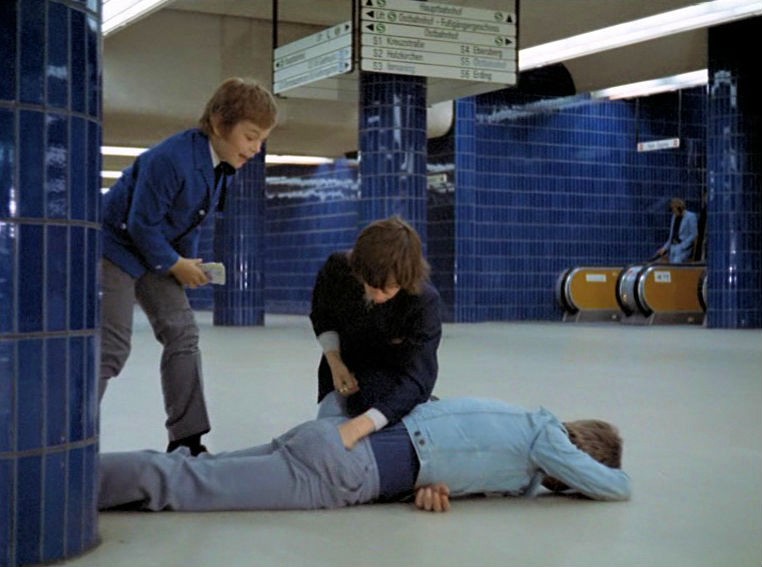
Fox and His Friends, Rainer Werner Fassbinder, 1975
Fassbinder denies his hero even the consolation of posthumous working-class solidarity, for — in a passage that reminds us of the ending of Robert Bresson’s The Devil Probably… (Le diable probablement… 1977), where the dead hero is robbed by his best friend — he wants him to appear uncompromisingly alone, humiliated, reduced to an anonymous lifeless body. The character’s masochistic streak is thus reflected and subsumed in the director’s broader vision, where human pathos is counterbalanced, if not eclipsed, by the sheer determination to stage the masochistic scene. Ultimately, Fassbinder’s filmmaking and biography meet. In both, the unbearable awareness of oppression feeds the assurance that freedom belongs to a condition of painful self-contraction brought about by the endorsement of the fundamental fantasy. For this reason, the direct translation of the film’s German title (‘the first law of freedom’) is more accurate. For Fassbinder, indeed, freedom begins with utter degradation.
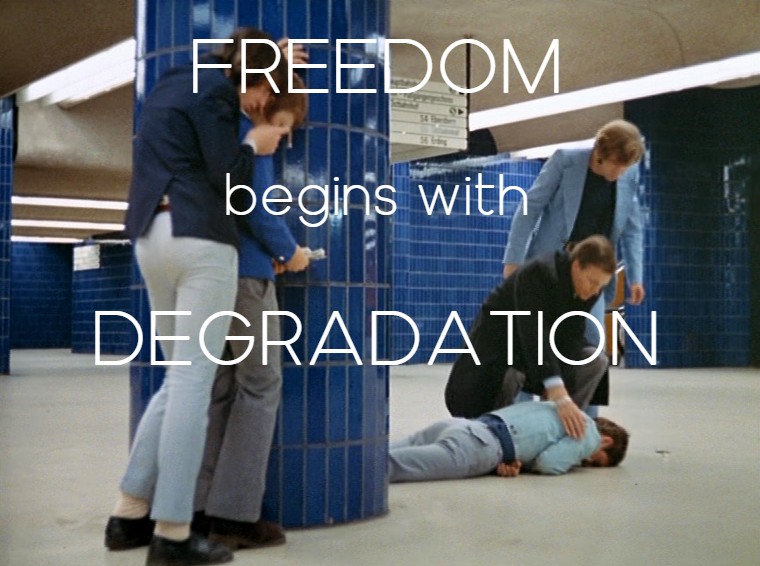
Fox and His Friends, Rainer Werner Fassbinder, 1975
We should not forget, however, that at the heart of Fox’s demise there lies the same old obstacle of Fassbinder’s cinema, the sexual deadlock. For Fox and Eugen the sexual relationship is indeed impracticable, since one gives everything (Fox), while the other simply takes (Eugen). It is not directly a matter of femininity vs masculinity, but rather gullibility (the nickname Fox is indeed ironic) vs greed and exploitation. When it comes to the melodramatic representation of sexual difference, Fassbinder tends to operate along the same lines: he consciously displaces the sexual deadlock onto the deadlock of class exploitation.
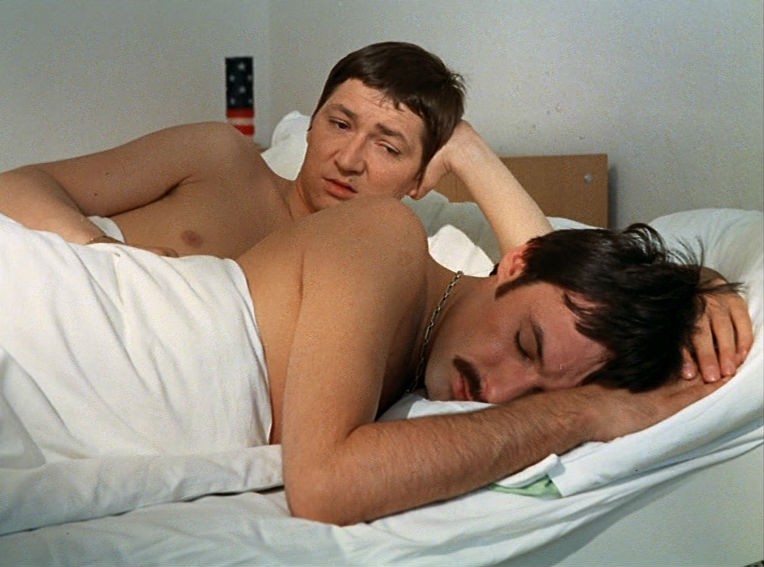
Rainer Werner Fassbinder & Peter Chatel, Fox and His Friends, 1975
If the emotional focus of almost all his films is a more or less melodramatic situation highlighting the tragic impossibility of relationships, the underlying argument he presents, as a rule, ends with the acerbic condemnation of social inequality. In ideological terms, therefore, Fassbinder would seem to distance himself from the Lacanian axiom of sexual difference. For him, the gap between the sexes is a historical consequence of a more profound malaise concerning the perverse (capitalist) organisation of the social sphere (capital does not spare the bed). As a ‘romantic anarchist’ (Fassbinder 1992: 67), he constructed most of his works around the melancholic utopia of unadulterated relationships in a society spared from capitalistic exploitation.
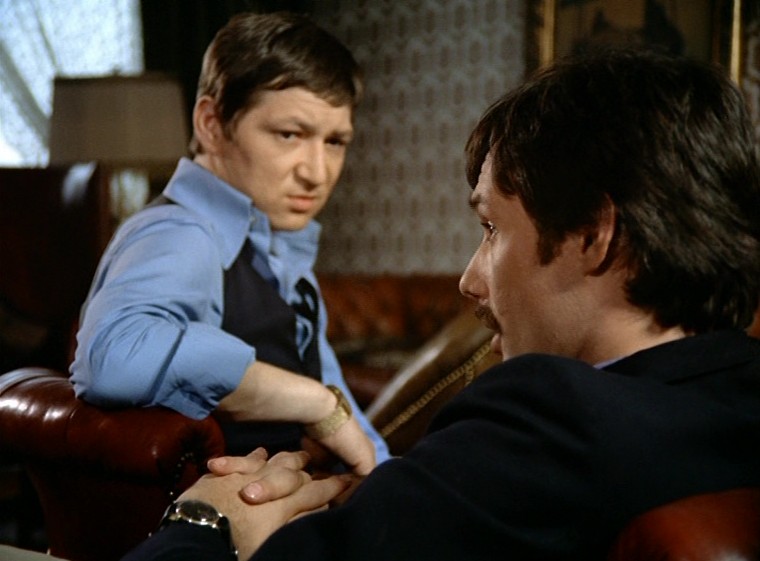
Rainer Werner Fassbinder & Peter Chatel, Fox and His Friends, 1975
We are now in a position to refine the understanding of the two poles of Fassbinder’s sensitivity: on the one hand a nihilistic obligation to emphasise the self-relating negativity of the subject, which emerges through death-drive and the staging of masochism qua fundamental fantasy; on the other, the persistence of melancholy, i.e. the fantasmatic attachment to a utopian condition of plenitude to come.
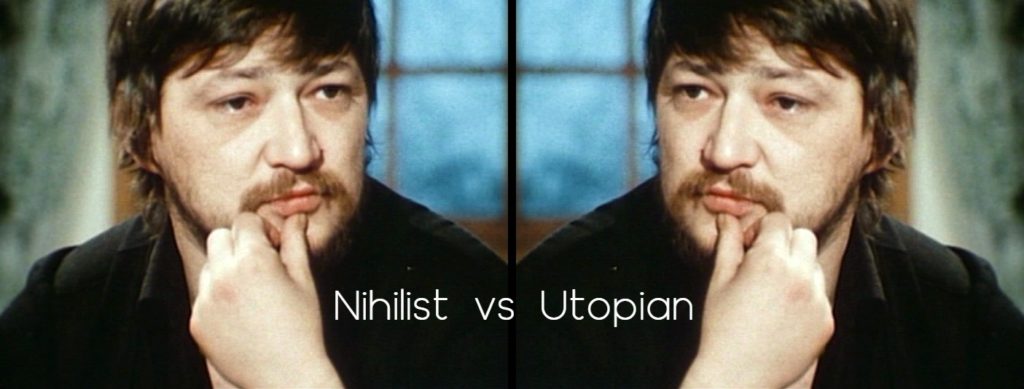
Rainer Werner Fassbinder
Masochism features strongly in all of Fassbinder’s melodramas, which, as is well known, were greatly influenced by Douglas Sirk. Here the Lacanian theme of the impossibility of the sexual relationship comes into full view, especially in the underlying equation of marriage and sadomasochism.
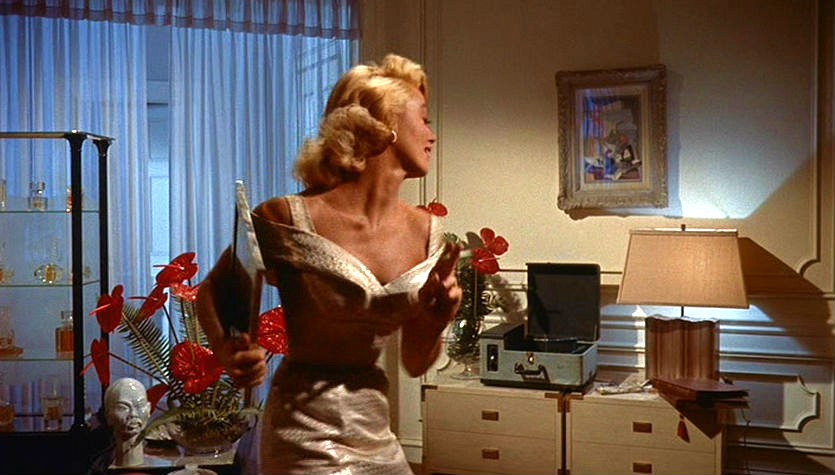
Dorothy Malone, Written on the Wind, Douglas Sirk
In an early classic like The Merchant of Four Seasons (Händler der vier Jahreszeiten, 1971), set in 1950s Germany, the displacement of sexual difference onto social alienation seems at first sight too prominent, too programmatic to channel sufficient emphasis into the main character’s masochistic drive. The explanation for the failure of the relationship between Hans (Hans Hirschmüller), a street fruit vendor, and Irmgard (Irm Hermann), his petit-bourgeois wife, is presented to us through a series of vaguely stylised flashbacks. Hans had served in the Foreign Legion and later joined the police, where he had been fired for lack of discipline. Before marrying Irmgard, he had naïvely fallen for the idea that a gift of flowers would win him a marriage proposal with another woman, ‘the great love of his life’ (played by Ingrid Caven, at the time married to Fassbinder), but she had rejected him on the grounds of his humble job. Fassbinder thus provides us with a coherent elucidation of his character’s inability to achieve personal happiness and integrate in his social milieu, in what is meant to be another highly critical film of the West German society of the Adenauer economic miracle.
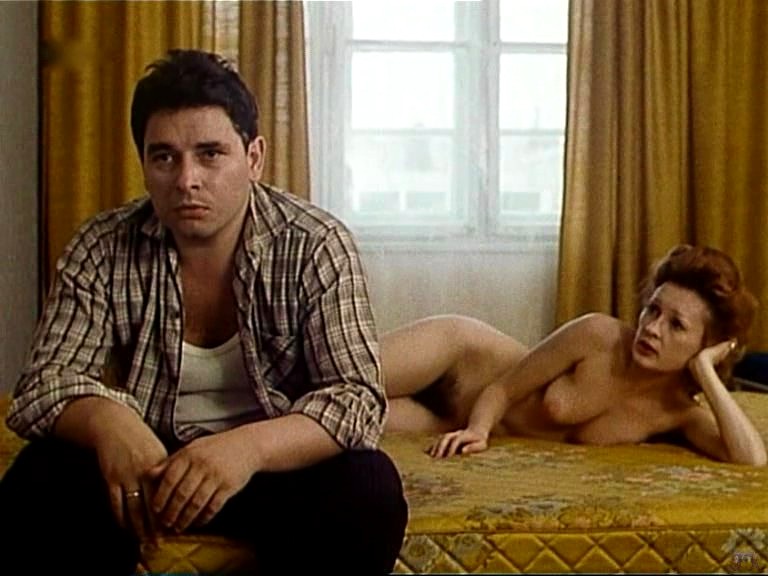
Hans Hirschmüller & Ingrid Caven, The Merchant of the Four Seasons, Fassbinder, 1972
To locate the film’s unconscious core, however, we need to look elsewhere, first and foremost in the insistence with which the camera cuts off Hans from his environment, suggesting either that, as in a Greek tragedy, his fate was always-already sealed, or, more insightfuly, that he somehow seeks his own undoing. The obstinacy of the camera’s gaze is correlative to the empty stare in his character’s eyes, which from the beginning alludes not only to his being doomed, but more precisely to his secret enjoyment of that tragic condition. This comes to the fore in the penultimate scene of the film, where Hans, having found the strength to momentarily step out of the daily grind that slowly consumes him, drinks himself to death in front of his petit-bourgeois relatives.
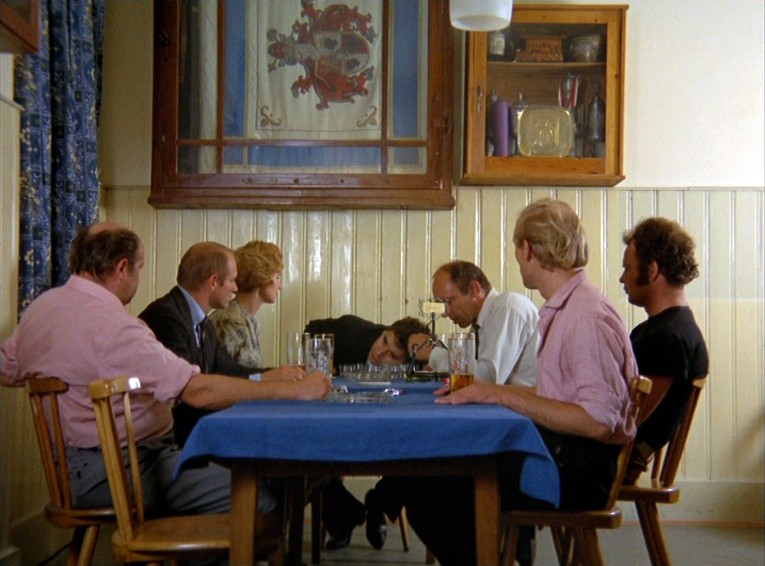
Rainer Werner Fassbinder, The Merchant of the Four Seasons, 1971
Despair and, eventually, suicide, play a double role in Fassbinder, serving both as a direct critical indictment of warped social relations and as a strategy to conjure up an image of redemption. What matters supremely to Fassbinder is the shattering encounter with the ‘void called subject’, for deep down he knows that only there an image of liberation from social oppression may arise. Being complicit in their downfalls, Hans and Fox voice both a powerful indictment of capitalist exploitation, and a metaphorical leap into freedom. In a passage that closely echoes Pasolini’s theory on the metaphorical resemblance of death and editing (see Pasolini 1995: 237-41), Fassbinder commented thus on the significance of death: ‘Life doesn’t become manageable and accessible until the moment when death is accepted as the true aspect of existence. As long as death is treated as a taboo, life remains uninteresting. A society based on the exploitation of human beings has to treat death as a taboo.’ (Fassbinder 1992: 29) Fassbinder’s films indicate that the taboo of death can be challenged if ‘death’ is coupled with ‘drive’. Metaphorically speaking, masochism for him implies the suspension of the character’s immersion in the symbolic order, achieved through the insistence of drive.
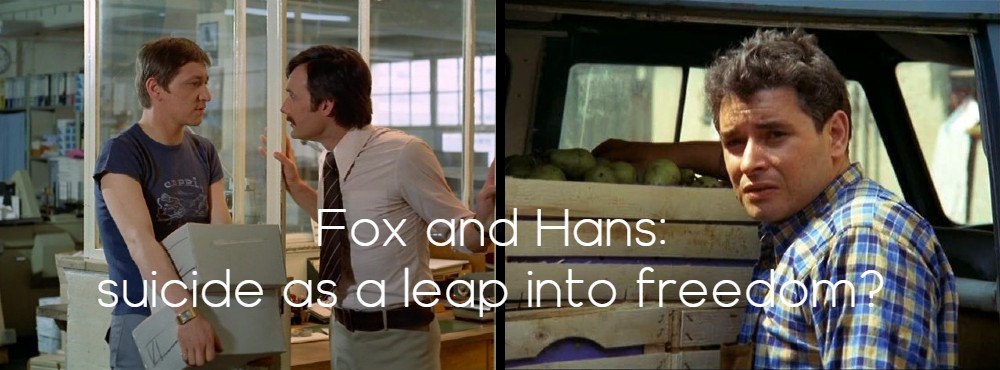
Fox and His Friends | Merchant of the Four Seasons
Let us recall the main argument. In Lacanian psychoanalysis the emergence of pure subjectivity coincides with what Zizek describes as an ‘experience of radical self-degradation’ whereby I, the subject, am emptied ‘of all substantial content, of all symbolic support which could confer a modicum of dignity on me’. The reason why such a humiliating and potentially perverse position of self-degradation is to be assumed, he argues, is that within a disciplinary relationship (between ‘master and servant’), self-beating is, in its deepest configuration, nothing but the staging of the other’s secret fantasy; as such, this staging allows for the suspension of the disciplinary efficacy of the relationship by bringing to light the obscene supplement which secretly cements it. Zizek’s central point is that this supplement ultimately cements the position of the servant: what self-beating uncovers is ‘the servant’s masochistic libidinal attachment to his master’, so as ‘the true goal of this beating is to beat out that in me which attaches me to the master’ (Zizek 2002a: 252). Ultimately, we are back to the fundamental fantasy, for what we witness there, in this non-subjectivisable scene, is the unbearable fascination with one’s submission that clandestinely sustains subjectivity itself.
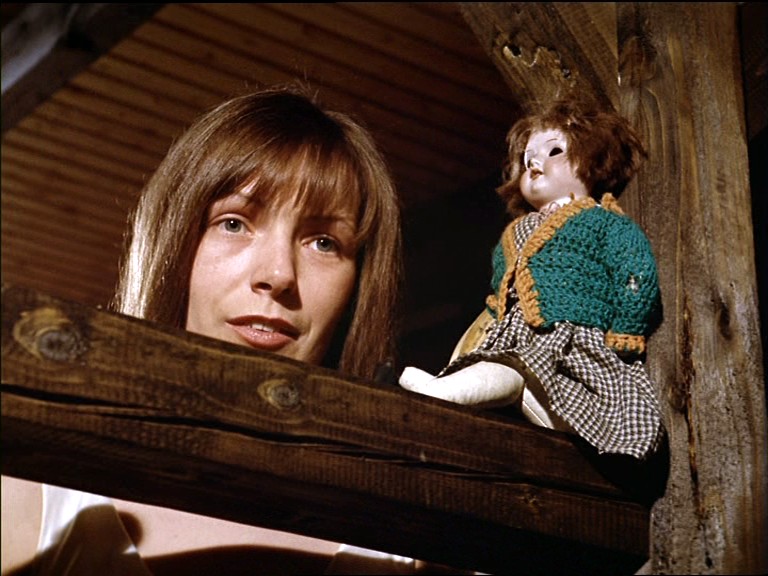
Margit Carstensen, The Bitter Tears of Petra von Kant, Rainer Werner Fassbinder
From this angle, the fundamental fantasy should be regarded as a key political category. Zizek’s analysis highlights the key question referred to at the start of this section: it is not enough for us to be aware of our state of subjection to change things, as that very subjection is sustained by the disavowed pleasure (jouissance) we find in being caught in it: ‘When we are subjected to a power mechanism, this subjection is always and by definition sustained by some libidinal investment: the subjection itself generates a surplus-enjoyment of its own. This subjection is embodied in a network of ‘material’ bodily practices, and for this reason we cannot get rid of our subjection through a merely intellectual reflection — our liberation has to be staged in some kind of bodily performance; furthermore, this performance has to be of an apparently ‘masochistic’ nature, it has to stage the painful process of hitting back at oneself.’ (Zizek 2002a: 253) Ultimately, the passage from ‘oppressed victim’ to ‘active agent of the revolution’ requires a move whereby the subject endorses that disavowed excess anchoring his identity in the socio-symbolic order qua power mechanism: ‘the only true awareness of our subjection is the awareness of the obscene excessive pleasure (surplus-enjoyment) we derive from it; this is why the first gesture of liberation is not to get rid of this excessive pleasure, but actively to assume it’ (Zizek 2002a: 254).
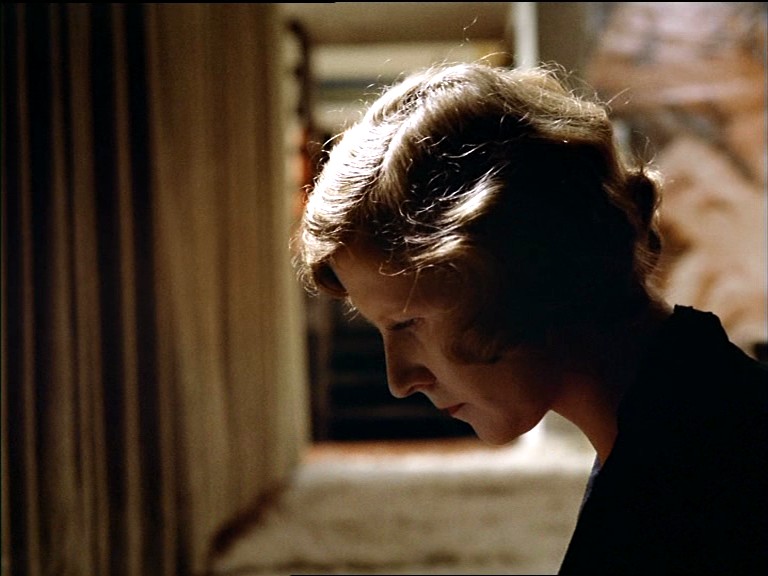
Irm Hermann, The Bitter Tears of Petra von Kant, Rainer Werner Fassbinder
FABIO VIGHI
Sexual Difference in European Cinema: The Curse of Enjoyment

Lucas Cranach the Elder, Adam, 1537
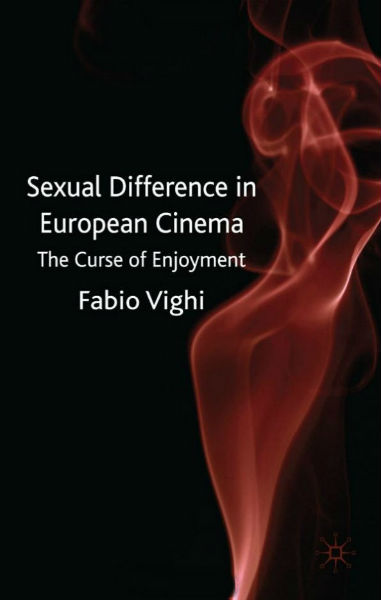
Fabio Vighi, Sexual Difference in European Cinema

Lucas Cranach the Elder, Eve, 1537
REFERENCES
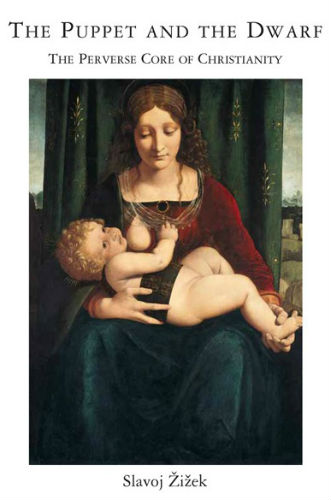
Slavoj Zizek, The Puppet and the Dwarf
Chiesa, L. (2007). Subjectivity and Otherness: A Philosophical Reading of Lacan. Cambridge, MA and London: The MIT Press.
Fassbinder, R.W. (1992). The Anarchy of the Imagination: Interviews, Essays, Notes. Baltimore: John Hopkins University Press.
Lacan, J. (1999). The Seminar. Book VII. The Ethics of Psychoanalysis. London: Routledge.
Pasolini, P.P. (1995). Empirismo eretico. Milan: Garzanti.
Rayns, T. (1979). Fassbinder. London: British Film Institute.
Sontag, S. (1964). ‘On Godard’s Vivre sa vie’. Moviegoer (2), 2-10.
Zizek, S. (2000a). The Ticklish Subject. London and New York: Verso.
Zizek, S. (2002a). Revolution at the Gates. London and New York: Verso.
Zizek, S. (2003). The Puppet and the Dwarf The Perverse Core of Christianity. Cambridge, MA and London: The MIT Press.
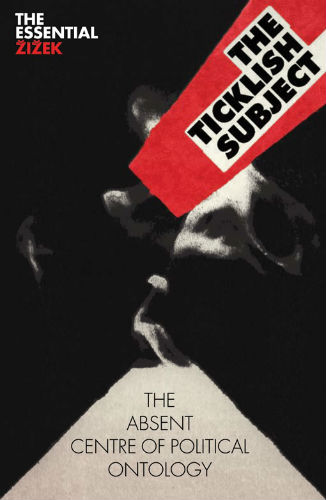
Slavoj Zizek, The Ticklish Subject
HARRY BAER ON ‘THE BITTER TEARS OF PETRA VON KANT’
Transcribed from the film by Robert Fischer, Harry Baer on Rainer Werner Fassbinder (2006), on the RWF Foundation/Arrow Films DVD of The Bitter Tears of Petra von Kant.
The Bitter Tears of Petra von Kant is a very important film because the viewer is bound to realize very quickly that it’s a camouflage. The part that Margit Carstensen plays is of course Fassbinder himself, and the part played by Hanna is actually Günther Kaufmann. The silent maid is Peer Raben. That’s how you have to see it. And Fassbinder wrapped all this up very cleverly in the whole cultural problem which he had with himself. He transposed it into the world of fashion, where this woman who is a famous fashion designer falls head over heels in love with someone. It’s a homosexual relationship, which nearly ruins her. We laughed a lot during filming, because we had heard all the lines in this film before. We had witnessed some of the scenes of jealousy in Fassbinder’s life, and sometimes we recognized things that had actually been said. These things had actually happened. This is a film that is so artificial that it is timeless. It’s one of those films that cannot age. It’s so stylized, it’s incredible.
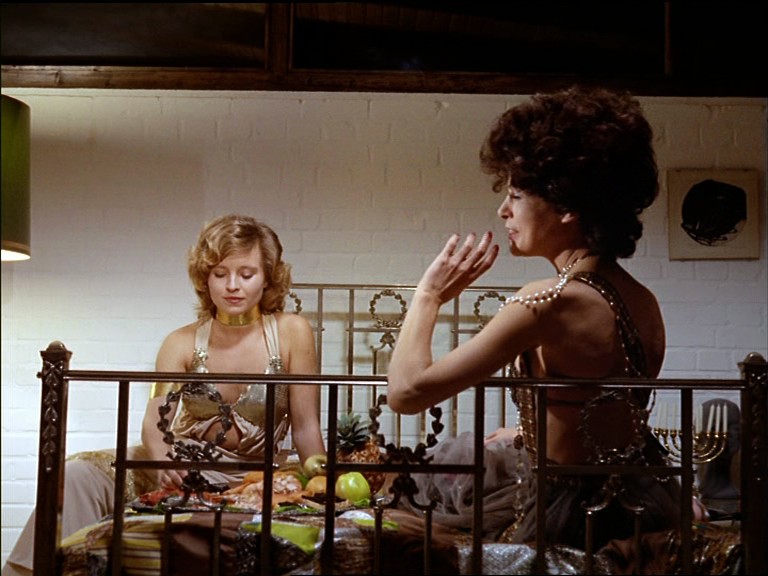
Hanna Schygulla & Margit Carstensen, The Bitter Tears of Petra von Kant, Fassbinder
‘THE BITTER TEARS OF PETRA VON KANT’ IN ‘MARA, MARIETTA’
FROM ‘MARA, MARIETTA’
Part Five Chapter 7
Saturday evenings at the cinema—The Bitter Tears of Petra von Kant; Aguirre, Wrath of God; Rhomer’s L’Amour l’après-midi; Ludwig, by Luchino Visconti.
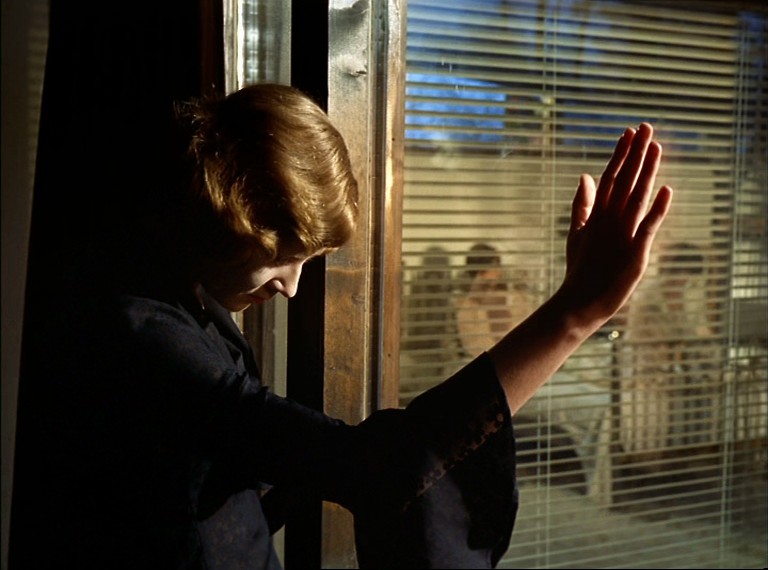
Irm Hermann, The Bitter Tears of Petra von Kant, Fassbinder

